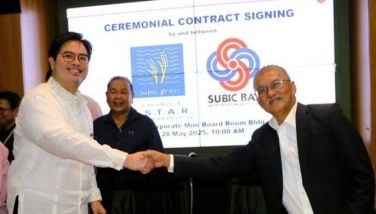Well-known marks

Back in 1997, US company In-N-Out Burger Inc. filed an application with the Philippine Bureau of Trademarks of the Intellectual Property Office (IPO) to register the trademark and service marks “In-N-Out” and “In-N-Out Burger & Arrow Design.”
It later found out that Sehwani Inc. and/or Benita’s Frites Inc., corporations organized in the Philippines, have already obtained trademark registration of the mark “In N Out” (the inside of the letter “O” formed like a star). By virtue of a licensing agreement, Benita was able to use the registered mark of Sehwani.
The US fastfood chain company in 2001 filed before the Bureau of Legal Affairs of the IPO an administrative complaint for cancellation of trademark registration and for unfair competition claiming that its trademarks are registered in the US and in other parts of the world, are internationally well-known, that the marks of Sehwani are clearly identical and confusingly similar, and that Sehwani is making it appear that its goods and services are those of the US firm, misleading ordinary and unsuspecting consumers that they are purchasing petitioner In-N-Out Burger’s products.
However, petitioner Sehwani argued that being the registered owner of the mark “In N Out,” they should be accorded the presumption of a valid registration of its mark with the exclusive right to use the same and that none of the grounds provided under the Intellectual Property Code for the cancellation of a certificate of registration in this case. It added that respondent had no legal capacity to sue as it had never operated in the Philippines.
The IPO legal affairs bureau decided in favor of respondent In-n-Out Burger, saying the latter had the legal capacity to sue and that it is the owner of international well-known marks. However, it did not find Sehwani guilty of unfair competition. The BLA ordered the cancellation of the certificate of registration in favor of Sehwani for the mark “In N Out.”
Both the motion for reconsideration with the BLA and appeal to the IPO director general were denied. The Court of Appeals also upheld the IPO director general’s dismissal.
The Supreme Court held that respondent In-N-Out Burger Inc. had the legal capacity to sue for protection of its trademarks, although it is not doing business in the Philippines.
It explained the Convention of Paris for the Protection of Industrial Property (Paris Convention) wherein both the US and the Philippines are signatories governs the protection of well-known marks and under the said treaty “countries of the Union or at the request of an interested party, undertake to refuse or to cancel the registration, and to prohibit the use, of a trademark which constitutes a reproduction, imitation, or a translation, liable to create confusion, of a mark considered by the competent authority of the country of registration or use to be well known in that country as being already the mark of a person entitled to the benefits of this Convention and used for identical or similar goods. These provisions shall also apply when the essential part of the mark constitutes a reproduction of any such well-known mark or an imitation liable to create confusion therewith.”
In its ruling, the SC said that the power to determine whether a trademark is well-known lies in the competent authority of the country of registration or use or the courts of the country in question if the issue comes before a court.
The SC said that the findings and conclusion of the IPO that respondents mark is a well-known mark is fully substantiated by the evidence on record and in accord with law. In previous inter-partes cases, the BLA had already declared the “In-N-Out Burger and Arrow Design” as an internationally well-known mark.
In determining that the mark is a well-known mark, the IPO used as basis various evidence presented by In-N-Out, including its US trademark registrations and its comprehensive advertisements therein.
The Intellectual Property Code of the Philippines under Republic Act 8293 provides that a mark cannot be registered if it is identical with or confusingly similar to a mark which is considered by the competent authority of the Philippines to be well-known internationally, whether or not the mark is registered here, when used for identical or similar goods or services. If the use of the well-known mark here is for goods or services which are similar, the said law requires that such well-known mark must be registered here and that it must be shown not only that the use of the mark would indicate a connection between those goods and services and the owner of the registered well-known mark and that the interests of the owner of the mark are likely to be damaged by such use.
Beginning April 28 of this year, the declaration of well-known marks can be done ex-parte. At present, the only way to obtain such a declaration is through adversarial litigation like opposition or cancellation of trademark registration petitions before the BLA or in trademark infringement or unfair competition cases in court.
The IPO issued Memorandum Circular 2025-009, which provides that trademark owner applicants must file an ex parte notarized application for the declaration of a well-known mark and submit the requirements. If the examiner finds the application compliant with the criteria for a well-known mark, it will recommend approval to the director of the Bureau of Trademarks which will then decide whether or not to grant or refuse the said application.
The mandatory criteria for determining whether a mark is well-known mark are: first, duration, extent, and geographical area of any use of the mark; second, market share in the Philippines and in other countries; third, degree of inherent or acquired distinction of the mark; and fourth, quality, image, or reputation acquired by the mark. Other factors may also be considered.
IP lawyers and senior partner Susan Villanueva and Natalie Isabel Lim of Cruz, Marcelo & Tenefrancia Law Office said that the promulgation of the IPO regulation is a welcome and necessary development in the evolving trademark landscape of the country and is anticipated to prompt international rights holders, global brands, and large business to proactively seek recognition of their well-known marks to deter unauthorized use and reduce reliance on post-facto remedies such as oppositions, cancellations, or court actions which are costly and time-consuming proceedings.
The Philippines has been out of the US government’s watchlist of countries with IP rights enforcement issues since 2014. The last time we were included in the EU’s was in 2019, indicating that our country is on the right path in terms of its efforts to curb piracy.
For comments, e-mail at maryannreyesphilstar@gmail.com
- Latest
- Trending































